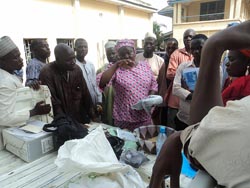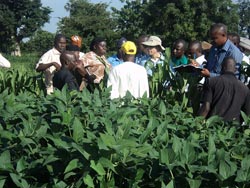The 2015 season commenced with a bee hive of activities after the Annual Review and Planning Meeting in Abuja, Nigeria. The driving force for these activities was the new engagements with private actors (NGOs) in the value chain to further expand the intensity of N2Africa activities, especially regarding dissemination, monitoring and evaluation. The Nigeria team was committed to pursue and implement these activities, popularly tagged as ‘New Partnerships’. These reflections on season 2015 highlight the training events 2015 and the training session on the use of ICT tablets for data collection.
1 Training events 2015
In order to create commitment and mutual understanding, the partners (USAID MARKETS 11, CRS- SHARE, SASAKAWA GLOBAL 2000 - AGRA and IFDC - 2 SCALE) participated in a series of training activities. Field agents, extension agents, lead farmers, BSS, Community based seed producers, community based officers, amongst others joined to align dissemination approaches and to understand the N2Africa objectives and expectations.
We conducted different training sessions in collaboration with our partners and N2Africa Post Graduate Scholars. The training events focused on topics such as inoculants handling and safe use of agro-chemicals, best agronomic practices for increased legume productivity in the Nigerian savanna, community based seed production and market linkages, use of ICT-tools for agronomy and M&E data collection, post harvest activities and the application of specific M&E Tools for data collection. Furthermore, agro-dealers received training on handling, storing and using agro-inputs.
Each of the partners further stepped down the training activities in their respective locations to address specific needs of the trainees and to further enhance learning, communication and application. For a more effective training, relatively, smaller populations of trainees were trained and training locations were decentralized for close proximity to where the partner operates.
Principally, N2Africa Project Staff were the main resource persons during such training events in collaboration with partners. However, additional technical information was sought for and obtained from other collaborators such as the National Agricultural Seed Council (NASC). At different occasions, the Council delegated her staff to participate in the training, especially when such trainings were related to community based seed production. Seed companies and agro-chemical companies also had a representation all of which was tailored to reach out to the farmers with innovations, which would enhance delivery and result.
 |
Left: Mrs. Esther Chinedu (FLO) demonstrating handling and application of inoculants Right: Practical demonstration in the field using the ICT tablet to collect, save and upload data |
 |
Training outcomes
Many trainees showed a good level of understanding in the application of tools used during those trainings (such as demo and adaptation Field Books). Field experimentation, land preparation, plot layout, plant establishments and treatments as well as management attracted good responses from the participants. Much enthusiasm was shown by the participants, who were offered the opportunity of being a community based seed grower within their own community.
2 Use of ICT tablets for data collection
Using ICT tablets to collect, save and upload agronomy or M&E data on the N2Africa database using the ODK format was another innovation introduced in 2015. Understanding its application under field conditions, paucity of the ICT tablets and taking into consideration the spread of trainees from varied educational background contributed to slowing down effort on usage. However, the benefits of this technology are obvious: the centralized data are now expected to be safer and available for a wider scrutiny. Uploading the data on the N2Africa platform by our partners is still a challenge across different locations.
We derived much inspiration from our trainees who were able to learn new things, acquired additional knowledge and expectedly added value to their respective work. There is hope for greater achievements in the coming season as we relate with all our partners in a more robust and result-driven collaboration. The future seems brighter now!
Bassey Ukem
